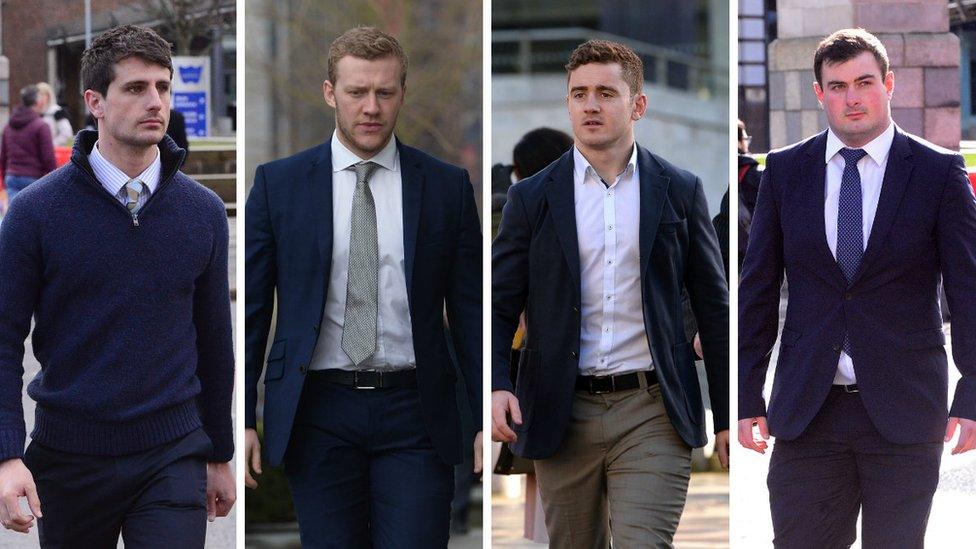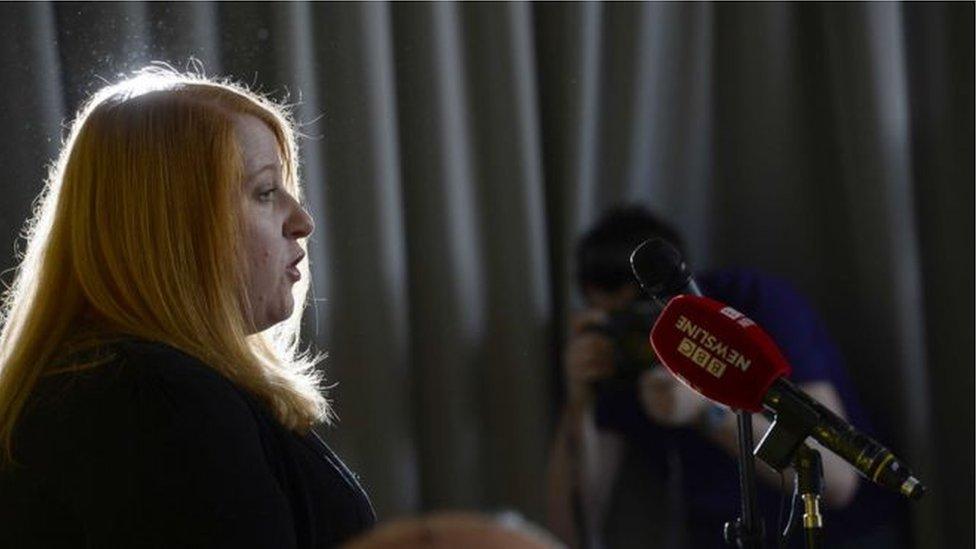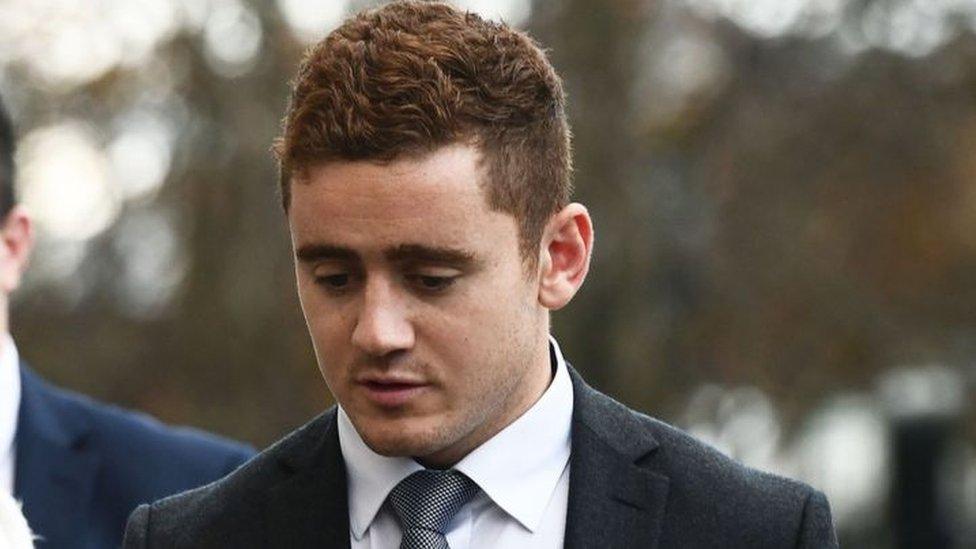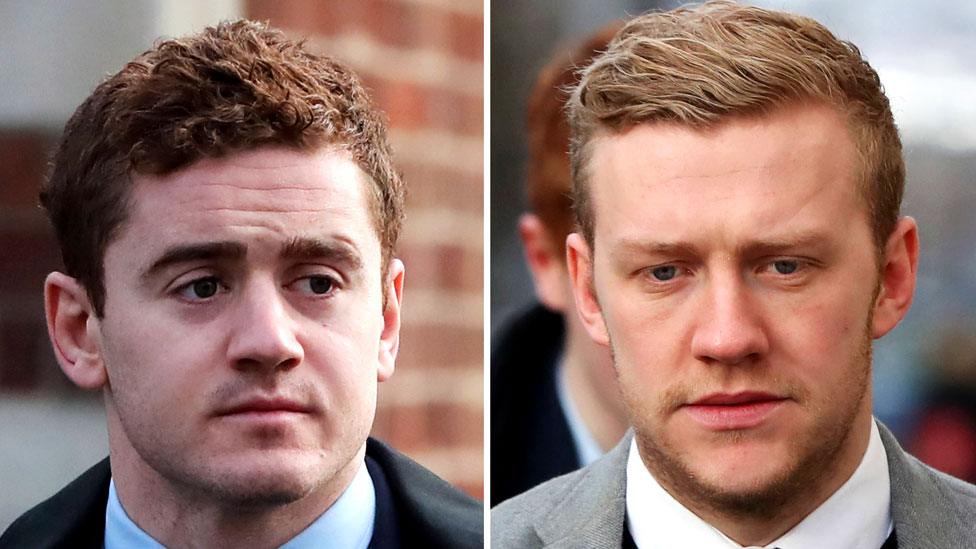Rugby rape trial: Restricted details emerge as ban is lifted
- Published

Blane McIlroy; Stuart Olding; Paddy Jackson; Rory Harrison were acquitted of all charges
Details withheld from jurors in a trial which acquitted rugby players Paddy Jackson and Stuart Olding of rape have been revealed after a ban was lifted.
The judge lifted reporting restrictions on Wednesday, meaning remarks made in open court during the trial, but in the jury's absence, can now be made public.
The pair were cleared of all charges.
Their co-accused, Blane McIlroy, was cleared of exposure while Rory Harrison was acquitted of perverting the course of justice and withholding information.
Many of the unreported details emerged during legal arguments but could not be published during the proceedings because the jury was not present, while others were withheld on the instructions of Judge Patricia Smyth.
The details included:
Evidence Mr Olding's semen had been found on the crotch of the complainant's clothing.
The jury had been told his semen had been found on her jeans but not on the crotch. Mr Olding had originally been charged with vaginal rape, which he denied, but this was dropped before the trial began. The judge ruled that specifying where the semen had been found would be prejudicial.
Some of the blood found on Paddy Jackson's bedsheets did not belong to the complainant.
The jury was shown photographs of Mr Jackson's bloodstained bedsheets. However, the judge ordered other bloodstains on the sheets, which did not come from the complainant, should be "airbrushed" from the photos after the defence argued they would distract the jury. The source of the other blood was never explained in the trial, and Mr Jackson's lawyer told the court he had "no intention of saying where this blood came from".
Rory Harrison sent a pornographic video clip of a consensual threesome to Mr Olding.
The video, showing three unknown people having sex, was sent two hours after all four defendants ate lunch in a Belfast cafe on the morning after the incident at Mr Jackson's house. The prosecution argued it supported their case that the four men had discussed what happened in Mr Jackson's bedroom and that Mr Harrison knew a threesome had taken place, despite later "claiming not to know what had occurred upstairs". The judge ruled the video was irrelevant and could be prejudicial.
A tweet by the Alliance Party leader Naomi Long disrupted the trial.
On the final week of the court case, Mrs Long took to Twitter to criticise a defence barrister Frank O'Donoghue QC after he told the jury: "A lot of very middle-class girls were downstairs, they were not going to tolerate a rape or anything like that." The Alliance leader called the remark "appalling" and asked if he meant that working-class girls "wouldn't care/don't matter/think rape is normal?" The barrister asked the judge to discharge the jury over the tweet but the judge rejected the application.
Social media reaction to Rory Best's trial attendance led to defence claims it could undermine justice
The Ulster and Ireland Rugby captain's appearance in the public gallery as the complainant began her testimony led to a social media frenzy, and at one point the hashtag #notmycaptain was trending on Twitter. Defence barrister Frank O'Donoghue QC argued it could dissuade witnesses from giving evidence and undermine the right to a fair trial. Mr Best was on a list of defence character witnesses but in the end he was not called to give evidence. The judge later told the jury: "The only reason why Mr Rory Best was in this court last week was because he was directed to be here by senior counsel" and she repeatedly warned them to ignore social media commentary.
The defence complained the judge was overly sympathetic towards the complainant
Mr Jackson's defence lawyer, Brendan Kelly, complained to the judge that in her closing remarks she had used an "emotive" and sympathetic tone when summing up the complainant's evidence, which was absent when she spoke about his client. The judge rejected the criticism and told the court defence lawyers had already reviewed her closing remarks in advance.
The judge rebuked a defence lawyer over his line of questioning of the complainant
Blane McIlroy's barrister, Arthur Harvey QC, cross-examined the woman on inconsistencies in her account of what Mr McIlroy was wearing when he entered Mr Jackson's bedroom. When she explained: "You go into shutdown," Mr Harvey asked the complainant why she had used the impersonal "you" and told her it was "almost as if you're repeating something you've read rather than your personal experience". The judge sent the jury out and warned Mr Harvey to "moderate your tone... this is a vulnerable witness by law".
- Published11 April 2018

- Published6 April 2018

- Published28 March 2018
